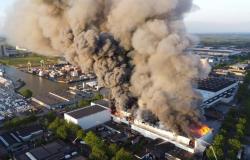
Hello Maral, a day after the arrests you were on campus. What did you find there?
‘The campus of Columbia University is normally accessible to everyone, but due to the protests the area is now completely cordoned off. You can only enter the university grounds with a pass; I don’t remember that happening before.
‘Because I happened to go to Columbia University myself, someone from my old faculty let me in. I expected a tense atmosphere, but that wasn’t too bad. The students were shocked by the arrests a day earlier, when police forces entered the site to break up their ‘encampment’.
‘Dozens of people have been suspended. They are afraid that they will no longer be able to complete their studies. At these types of elite schools you can easily pay 60 thousand dollars per year. The last time students were arrested on a large scale was in 1968, during demonstrations against the Vietnam War.’
About the author
Maartje Geels is a general reporter for de Volkskrant.
Who are the protesters? Why are they on campus?
‘It concerns a group of students who are against Israel’s approach in Gaza. They demand that the university cut ties with companies that play a role in the Gaza war. This tactic is not new: during apartheid, students at Columbia University put pressure on companies investing in South Africa, and that proved successful.
‘It is not surprising that the Gaza war is among Americans. Washington plays a role in supporting Israel with billions of dollars. That is taxpayer money that causes Palestinian victims, students say. They want that support to stop.”
Why are students not allowed to demonstrate? Doesn’t this fall under academic freedom?
‘According to the Columbia University administration, setting up a camp on campus is against the rules. The subject itself is also extremely sensitive. At the time, the US was the first to recognize Israel as an independent state and for a long time there was a sense of guilt in the country towards the Jewish community. You did not publicly question American support for Israel.
‘That has changed since the advent of social media. Young Americans see images coming in on their phones of the way Palestinians are treated in Israel. Moreover, this generation is very activist. These students grew up during the Black Lives Matter protests after the death of George Floyd in 2020. They view Israel’s policies much more critically than their parents. The older generation of Americans is not used to all this Israel criticism: they find it very radical to see protests in which people call Israel a perpetrator and say that the country is guilty of genocide.
How do Jewish students and staff respond? An Israeli university lecturer is no longer allowed on campus because he allegedly bullied demonstrating students.
‘There are many Jewish students among the demonstrators, I saw many people walking around with yarmulkes. On Monday evening they celebrated Passover during the protest. At the same time, protesters’ views are also raising fears among Jewish student clubs that support Netanyahu’s government. They believe that criticism of Israel is criticism of themselves, so they consider it anti-Semitism. They don’t want to walk on a campus where the Israeli government is under attack.”
The American government is now involved in the protests. What’s up with that?
“The eviction of Columbia University took place at the direction of President Minouche Shafik. She had to answer to a committee of the House of Representatives last week because of signals of increased anti-Semitism on her campus. Right-wing Republicans took the lead in that hearing. They see institutions like Columbia as left-wing strongholds where conservative voices are suppressed. They think all this Israel criticism on campuses goes too far. They are also afraid of growing anti-Semitism.
‘That branch of the party achieved success with previous interrogations. Two other presidents, from Harvard University and the University of Pennsylvania, performed poorly at the time, which ultimately led to their departure.
‘Now the chairman of Columbia is under fire. However, she does not want to give up her job and has gone along quite far with the Republicans’ criticism of the events on campus. That’s probably why she called the police. That, in turn, has made students and some teachers angrier. They wonder why their administration gives in to right-wing politics from Washington.’
Tags: campus Columbia arrests older generation Israel criticism
-




